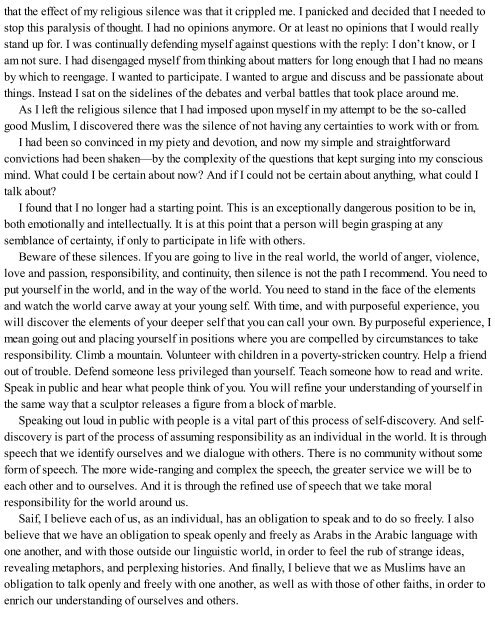1250119847
You also want an ePaper? Increase the reach of your titles
YUMPU automatically turns print PDFs into web optimized ePapers that Google loves.
that the effect of my religious silence was that it crippled me. I panicked and decided that I needed to<br />
stop this paralysis of thought. I had no opinions anymore. Or at least no opinions that I would really<br />
stand up for. I was continually defending myself against questions with the reply: I don’t know, or I<br />
am not sure. I had disengaged myself from thinking about matters for long enough that I had no means<br />
by which to reengage. I wanted to participate. I wanted to argue and discuss and be passionate about<br />
things. Instead I sat on the sidelines of the debates and verbal battles that took place around me.<br />
As I left the religious silence that I had imposed upon myself in my attempt to be the so-called<br />
good Muslim, I discovered there was the silence of not having any certainties to work with or from.<br />
I had been so convinced in my piety and devotion, and now my simple and straightforward<br />
convictions had been shaken—by the complexity of the questions that kept surging into my conscious<br />
mind. What could I be certain about now? And if I could not be certain about anything, what could I<br />
talk about?<br />
I found that I no longer had a starting point. This is an exceptionally dangerous position to be in,<br />
both emotionally and intellectually. It is at this point that a person will begin grasping at any<br />
semblance of certainty, if only to participate in life with others.<br />
Beware of these silences. If you are going to live in the real world, the world of anger, violence,<br />
love and passion, responsibility, and continuity, then silence is not the path I recommend. You need to<br />
put yourself in the world, and in the way of the world. You need to stand in the face of the elements<br />
and watch the world carve away at your young self. With time, and with purposeful experience, you<br />
will discover the elements of your deeper self that you can call your own. By purposeful experience, I<br />
mean going out and placing yourself in positions where you are compelled by circumstances to take<br />
responsibility. Climb a mountain. Volunteer with children in a poverty-stricken country. Help a friend<br />
out of trouble. Defend someone less privileged than yourself. Teach someone how to read and write.<br />
Speak in public and hear what people think of you. You will refine your understanding of yourself in<br />
the same way that a sculptor releases a figure from a block of marble.<br />
Speaking out loud in public with people is a vital part of this process of self-discovery. And selfdiscovery<br />
is part of the process of assuming responsibility as an individual in the world. It is through<br />
speech that we identify ourselves and we dialogue with others. There is no community without some<br />
form of speech. The more wide-ranging and complex the speech, the greater service we will be to<br />
each other and to ourselves. And it is through the refined use of speech that we take moral<br />
responsibility for the world around us.<br />
Saif, I believe each of us, as an individual, has an obligation to speak and to do so freely. I also<br />
believe that we have an obligation to speak openly and freely as Arabs in the Arabic language with<br />
one another, and with those outside our linguistic world, in order to feel the rub of strange ideas,<br />
revealing metaphors, and perplexing histories. And finally, I believe that we as Muslims have an<br />
obligation to talk openly and freely with one another, as well as with those of other faiths, in order to<br />
enrich our understanding of ourselves and others.
















